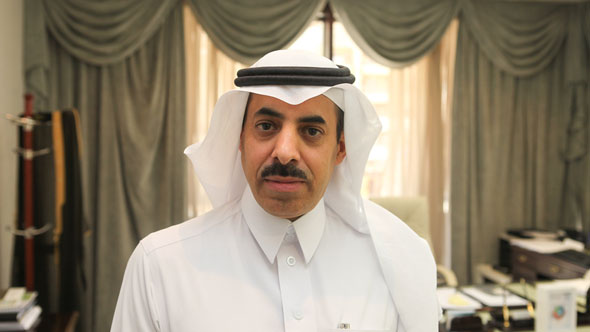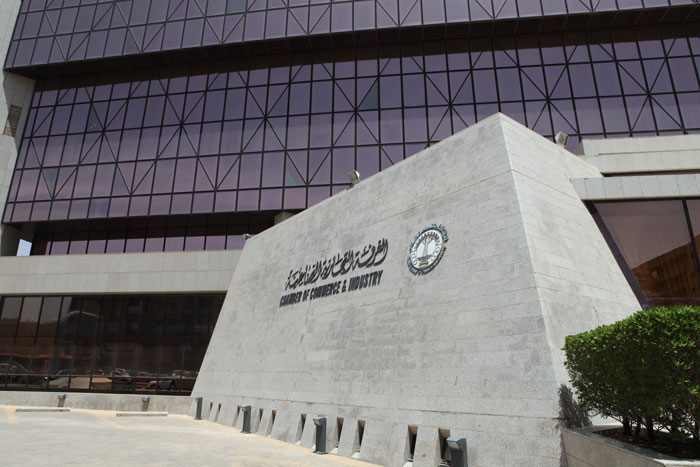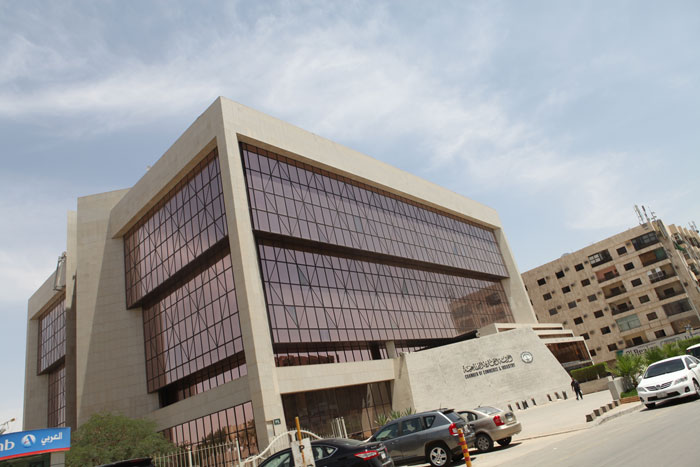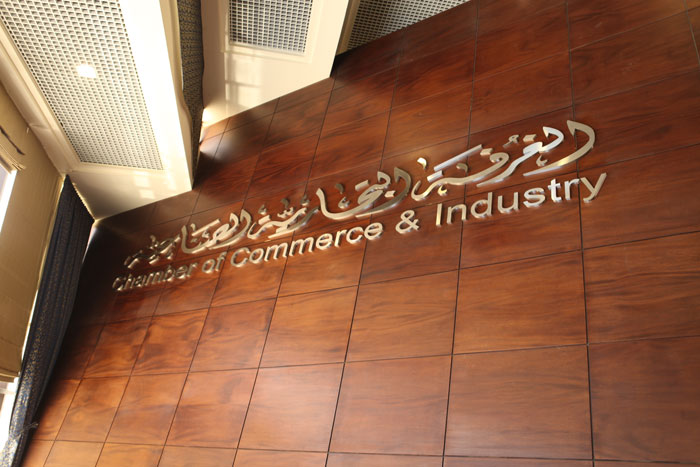Saudi Arabia: Private Sector Stronger with Improved Business Environment
Dr. Mohammed H. Al Kathiri, Secretary-General of Riyadh Chamber of Commerce and Industry
The Saudi economy in general has been growing over the last few years and is going to continue growing according to statistics from the Ministry of Economy and Planning and in view of what’s going on in the region. Saudi Arabia is the largest economy in the region and is a member of the G20; it is one of the world’s leading oil producers and exporters and the largest producer of petrochemicals in the Middle East.
Interview with Dr. Mohammed H. Al Kathiri, Secretary-General of Riyadh Chamber of Commerce and Industry

Saudi Arabia ranked 26th in the ease of doing business, and it’s one of the easiest places to do business in the Middle East while the UAE was 23rd. What are the challenges that Saudi Arabia faces when it comes to the ease of doing business?
If you compare Saudi Arabia with other countries in regard to doing business, and also if you compare doing business in Saudi Arabia these days with some years ago, you will definitely find improvement. It is getting easier for foreign companies to come to Saudi Arabia and start their own business.
The Saudi economy in general has been growing over the last few years and is going to continue growing according to statistics from the Ministry of Economy and Planning and in view of what’s going on in the region. Saudi Arabia is the largest economy in the region and is a member of the G20; it is one of the world’s leading oil producers and exporters and the largest producer of petrochemicals in the Middle East.
If you take into account the vision of the government of Saudi Arabia in terms of improving businesses and business environment, and also if you look at Saudi Arabia as one of the G20 members, there is still work to be done. The government has the ambition to strengthen the private sector and the economy in general; therefore, for doing business in Saudi Arabia, even with all these improvements that took place over the past few years, I think we still need to do more in order to compete with other countries that are working hard to enhance their business environment.
I think the difficulties encountered by the Saudi government are like those that other countries normally face. For example, one of the main concerns of the government of Saudi Arabia now is employment and how to motivate younger Saudis to work for the private sector. Also, with the new regulations that have been put in effect by the Ministry of Labor, some business people look at that as one of the difficulties that are facing their companies. But if companies know how to deal with these things and meet Saudiization requirements, I think these issues could be solved.
What is the outlook for the general economy and what are the economic challenges that Saudi Arabia is facing at the moment?
I think the outlook is promising. The Saudi economy in general has been growing over the last few years and is going to continue growing according to statistics from the Ministry of Economy and Planning and in view of what’s going on in the region. Saudi Arabia is the largest economy in the region and is a member of the G20; it is one of the world’s leading oil producers and exporters and the largest producer of petrochemicals in the Middle East. If you look at these factors altogether, I believe you would realize that the Saudi economy is doing well and is expected to continue this growth and enhance the achievements we have seen over the last few years.
Talking about FDI (foreign direct investments), what is the outlook for the FDI and how is the Chamber contributing to attract the FDI?
Regarding FDI as well as local investment, had the economy been doing well and we have been doing fine, this will be more attractive for both local Saudi and international businesses; therefore, the future of the FDI in Saudi Arabia is promising. I also believe that SAGIA (Saudi Arabia’s General Investment Authority) is doing its best in attracting foreign investments into the Kingdom.
At the same time, the government injected huge amounts of funds into the market, which have created a good environment not only for local Saudi investors but also for non-Saudis who are interested in investing in Saudi Arabia. Therefore, I imagine the future is bright in this connection as the Saudi government encourages FDI and has already established SAGIA to look after investments, both internally and externally. I suppose foreign investment is a good indication of how smartly the government is tackling this issue, especially foreign investments, and attracting such assets into the country.
Six months ago, the Chamber has formed a committee and termed it the International Cooperation Committee. This committee has comprised several foreign investor CEOs from major companies investing in Saudi Arabia. It watches over obstacles facing those investors who invest in Saudi Arabia and contacts government agencies to facilitate procedures and remove such obstacles. This is essentially a direct support to foreign investors, knowing that all activities of the Chamber are streamlined to facilitate procedural processes and help the private sector in general, including foreign investors as well, to work in a friendly environment.
Suppose there is an individual investor, a company, the first thing this company would do in a foreign country is to head to the Chamber of Commerce. What would you tell such a company and the similar ones?
First of all, the Chamber will provide them with the information they would need and ask them what kind of sectors they are interested in. Then, it will provide them with a variety of feasibility studies and help put them in contact with businesses matching theirs in the Kingdom. The Riyadh Chamber has many committees for different purposes; each one looks after a particular sector. To name a few, there is the industrial committee, the commercial committee, the real estate committee, the construction committees .. etc. Through these committees, we can obtain access to each sector of the economy and therefore can do a kind of networking between foreign investors and Saudi companies.
What are the sectors that offer the most investment potential, which are the most lucrative ones?
In point of fact, the relationship between the public and the private sectors is not satisfying either party; both sides complain. However, this is not confined to Saudi Arabia only but applies also to many countries. Lately, the both sides understanding of each other is improving with the increased experience of the private sector in the Saudi marketplace and also with the help of the Riyadh Chamber.
I would say construction, real estate, health, education and energy sectors. I believe that, luckily, almost all the sectors in Saudi Arabia are doing fine and their future is as good too.
How do you see the future cooperation between the public and the private sectors? Steffen Hertog quotes in his book some of the case studies in the investment law concerning the WTO negotiations. He was critical of the private sector and his criticism stemmed from the fact that the private sector was’ able to produce a concerted lobbying effort to incorporate some of their interests into this legislation, and that it was on a case-to-case basis, and the entire private sector was’ able to work as a whole. In this light, how do you see the future cooperation? Do you think the Chamber should be more proactive?
In point of fact, the relationship between the public and the private sectors is not satisfying either party; both sides complain. However, this is not confined to Saudi Arabia only but applies also to many countries. Lately, the both sides’ understanding of each other is improving with the increased experience of the private sector in the Saudi marketplace and also with the help of the Riyadh Chamber.
The Riyadh Chamber of Commerce represents the interests of the private sector through those committees and at the same time it seeks to raise the unresolved issues facing the private sector to the government. There are different channels to this end, either by meetings with ministers and government officials or by written support in the form of studies that pinpoint those difficulties facing the private sector; therefore, I think that the relationship between the public and private sectors in Saudi Arabia is improving. It is getting better in terms of them understanding the different roles of each side. Even government agencies know the role played by the private sector, and sometimes encourage and assist the private sector to continue playing an active role in the economy.
What are your priorities for lobbying? What would you like to achieve as a Chamber for the private sector? What are the main points you would like to raise with the government?
This depends on the particular sector that we are representing, knowing that we represent all private subsectors, including industry, commerce, real estate, construction, tourism .. etc. The Riyadh Chamber represents all of them and tries to support them; therefore, there is no particular issue. However, the main issue of all times, Saudiization, is still what the private subsectors are facing now in terms of how the private enterprises deal with the new Saudiization laws and regulations decreed by the different government agencies and the Ministry of Labor in particular. Also, there are the official procedures and bureaucratic system in the government that you would sometimes have to deal with. These things are shared by all sectors, while each subsector has its own specific issues and difficulties that it faces.
So Saudiization is number one issue and the second one is bureaucracy?
It is the workforce in general; it is how to get more Saudis into private business as well as how to get non-Saudis involved when needed. Secondly, it is the bureaucracy. These are the two main common difficulties that are currently facing the private sector.
The government is not helping a lot because they set a minimum wage that was above maybe 90% of what is being paid in the private sector. So there are some specific issues that need to be addressed. How is Saudi Arabia’s private sector different from that of other countries in the GCC and perhaps compared to that in the West as well?
Compared to the other GCC states, Saudi Arabia has the largest private sector in the region. It also has a good experience as its private sector has a well-established involvement in conducting mega projects, mainly in the relation with government agencies and with the economy in general as the Kingdom follows the free market economy where the private sector enterprises can deal with any country; import from any country and export to any country. I believe this gives an advantage to the Saudi private sector. Besides, the government supports the market with a great deal of investments and spending, which gives good opportunities to the private sector to grow. That is why we see lots of companies grow and lots of new companies enter the market.
So, basically the difference is that it’s the largest private sector?
It’s the largest and the most contrastive private sector in the region. Differences come from the condition of the country as the country’s geopolitical location, size, regulations, and political stability and many other factors affect the private sector. Private sectors live and nourish in economic and political environments not to mention the demographic factors that greatly affect the private sector as well. All of these factors contribute to the differences between private sectors with the emphasis that the private sector would positively grow in a favorable environment.
Saudi Arabia is the land of mega-projects. We see four economic cities being built worth 69 billion dollars and we have other mega-projects like the Riyadh metro. Do you think that the mega-project strategy is the right way to go forward given that in the private sector and the economy, the biggest job creators are small and medium enterprises? Should more emphasis be given to support SMEs than these mega-projects?
I would answer yes for both. We need to encourage the mega-project strategy and support the SMEs as well since mega-projects involve technology transfer, experience and more job security. At the same time, we need to support and also encourage the SMEs. This is what the Saudi government is doing. There are some different incentives and programs for SMEs and the Riyadh Chamber of Commerce has also a committee and a department that work together to help and support the SMEs. So, the answer is yes for both. I think we need both; the mega-projects as well as the SMEs.
What is the situation with SMEs? Do you think it is very challenging? What is the membership feedback you get from SMEs?
The Riyadh Chamber of Commerce has around 120,000 members and most of them are SMEs. Generally speaking, in Saudi Arabia the SMEs still need more support from both the chambers of commerce and the government. They need more assistance, more services and more direction from the Saudi chambers, not only from the Riyadh Chamber but also from all the Chambers all over the Kingdom, as well as from the government agencies.
How do you support the SMEs?
SMEs are being supported not only through the Riyadh Chamber but even through other agencies; government agencies and initiatives in addition to other Saudi chambers make a big difference in supporting the SMEs. However, looking into the number of SMEs, one would ask whether or not there are enough services to cope with the enormous number of such enterprises. That is why we still need more services and more support.
The latest figure is that the private sector represents 48% of the economy. Do you think that is accurate? Do you think it should grow?
Yes, I definitely think it should grow. The main issue we are facing in Saudi Arabia is how to diversify the economy and reduce the dependency on oil. Currently, more than 85% or 90% of all income is generated from oil. We should work hard in order to reduce this reliance on oil, the private sector can play a major role in this regard. Once the private sector is enlarged and expanded, the Kingdom’s economy would have more industries and more exports; this will help reduce dependency on oil and also diversify the economy, which is really important for the future of the Saudi economy.
Regarding foreign investment, many Saudi SMEs fear the entrance of SMEs from the West because they can bring technology but they also can drive them out of business. They might feel unprotected. What should be the line between allowing foreign enterprises to enter Saudi Arabia and where should you put the barrier so they wo’ drive local SMEs out of business because of their better management skills .. etc.?
I do’ think the entrance of foreign SMEs will be a threat for Saudi SMEs. With the recent strict enforcement of the labor law and the correction procedures that have been taking place by the initiative of the Ministry of Labor, I think more business opportunities will be created for the SMEs in Saudi Arabia. Non-Saudis who would like to or are willing to work in Saudi Arabia might find opportunities to join the Saudis and work together since I believe the local SMEs in Saudi Arabia know the market and the culture very well and therefore I do’ see any threat in that. On the contrary, I trust foreign SMEs will be a plus for both Saudis and non-Saudis as the marketplace is large enough and encourage not only Saudis but non-Saudis as well.
It’s also important for foreigners to find the right partner.
If foreign SMEs come to Saudi Arabia they will bring technology and managerial experience with them, but they would need to know the marketplace and the people in the country. They need people to open opportunities for them and open doors for them. Some of such SMEs may prefer to enter the Saudi market with 100% wholly-owned by non-Saudis and meet the SAGIA requirements, but others may find it better for them to enter into partnerships with Saudi partners; both will be beneficial for both non-Saudi owners and Saudi partners.